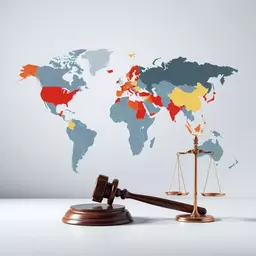Strategies for Interpol Red Notices

In the intricate realm of international law, a single alert can change lives forever. Interpol Red Notices, while not arrest warrants, serve as critical warnings that hold significant weight across borders. Understanding their implications is essential for anyone affected by them.
What You Will Learn
- Definition of Red Notices: Interpol Red Notices are requests to locate and provisionally arrest individuals pending extradition; they are not legal mandates for arrest.
- International Cooperation: Red Notices enhance collaboration among law enforcement agencies, making it harder for fugitives to evade justice simply by changing countries.
- Process Guidance: If you receive a Red Notice, it's crucial to remain calm and seek expert legal counsel to understand the implications and navigate your options.
- Appeals and Asylum: Individuals facing a Red Notice may challenge it through legal means, including seeking asylum if they fear persecution in their home country.
Key Aspects of Interpol Red Notices
Understanding the significance and implications of Interpol Red Notices can be vital for individuals affected by them. Below is a comparative overview of their main functions and impact. For more detailed information on navigating these notices, consider exploring resources on navigating Interpol Red Notices and legal defense.
Facilitating Extradition
Red Notices act as a bridge for countries to negotiate extradition treaties, allowing for legal action across borders.
Protecting Citizens
These notices help protect citizens by preventing fugitives from finding refuge in other countries.
Combating Organized Crime
Red Notices are crucial in targeting members of international crime syndicates, enhancing global law enforcement efforts.
Information Sharing
Red Notices facilitate the sharing of crucial information about wanted individuals among member countries.
Understanding Interpol Red Notices: Definition and Significance
In the complex world of international law, Interpol Red Notices play a crucial role. But what exactly is a Red Notice? At its core, a Red Notice is a request issued by Interpol to locate and provisionally arrest a person pending extradition, surrender, or similar legal action. It is vital to understand that a Red Notice is not an international arrest warrant; instead, it's a tool that helps facilitate cooperation among police forces worldwide.
So, why should one care about Interpol Red Notices? For individuals facing such notices, the implications can be serious. It can significantly impact their freedom, reputation, and legal standing in various jurisdictions. As someone committed to empowering individuals through knowledge, I want to break down the key aspects of Red Notices and why they're significant in the realm of extradition and international law.
What Is an Interpol Red Notice?
An Interpol Red Notice serves as a critical alert within the international law enforcement community. When a country issues a notice, it indicates that they want to pursue legal action against a person accused of a crime. In essence, this notice informs other member countries to be on the lookout for the individual and potentially detain them if they cross borders.
- Not a Legal Obligation: A Red Notice does not compel member states to arrest the individual; it serves as an advisory.
- Information Sharing: It includes details about the person, the criminal charges, and the legal basis for the request.
- Validity Across Borders: Since Interpol is a network of countries, Red Notices are recognized internationally, increasing the chances of apprehension.
The Purpose and Function of Red Notices in International Law
Red Notices are essential for promoting international cooperation in the fight against crime. They help maintain a system where individuals accused of serious offenses cannot easily escape justice by simply moving to another country. In my experience at Extradition Interpol UAE, I have seen how these notices can serve as both a deterrent and a tool for legal enforcement. For more insights on how Interpol influences extradition processes, read about Interpol's influence on extradition processes.
Furthermore, Red Notices can enhance the effectiveness of law enforcement agencies around the globe. By sharing information about wanted individuals, countries can collaborate more efficiently. Some key purposes of Red Notices include:
- Facilitating Extradition: They pave the way for countries to negotiate extradition treaties.
- Protecting Citizens: They help to protect citizens from potential fugitives seeking refuge.
- Combating Organized Crime: Red Notices are crucial in targeting members of international crime syndicates.
Pro Tip
Did you know? Engaging a legal expert who specializes in extradition cases can significantly improve your chances of a favorable outcome. They can provide you with tailored advice, help navigate the complexities of the legal system, and ensure your rights are protected throughout the process.
Addressing Common Questions and Misconceptions About Red Notices
When it comes to Interpol Red Notices, many people have questions swirling in their minds. What exactly does a Red Notice mean? How does it impact individuals who find themselves in its crosshairs? At Extradition Interpol UAE, I aim to demystify these notices, addressing common concerns and misconceptions that can arise in this complex area of international law. For those seeking legal assistance, finding reputable criminal defense lawyers in Dubai can be a crucial first step.
Understanding the ins and outs of Red Notices is crucial, especially if you or someone you know is affected by one. Let’s tackle some of the most frequently asked questions to provide clarity and guidance on this important topic!
Frequently Asked Questions Regarding Interpol Red Notices
- What is an Interpol Red Notice?
- An Interpol Red Notice is a request to law enforcement worldwide to locate and provisionally arrest a person pending extradition, surrender, or similar legal action. It is NOT an international arrest warrant.
- What is the primary purpose of a Red Notice?
- The primary purpose is to facilitate international cooperation among police forces, helping countries bring fugitives to justice and combat transnational crime.
- Is a Red Notice a legal obligation for member countries to arrest someone?
- No, a Red Notice is an advisory. It does not compel member states to arrest the individual but prompts them to be on the lookout and potentially detain the person if they cross borders.
- What should I do if I receive an Interpol Red Notice?
- It is crucial to remain calm and seek expert legal counsel immediately. A knowledgeable lawyer can help you understand the implications and guide you on the best steps forward.
- How long does the process of removing a Red Notice take?
- There's no fixed timeline. The duration varies widely based on the specifics of the case, the legal strategies employed, and the complexities involved. Engaging an experienced legal team can help expedite the process.
- Can a Red Notice be challenged?
- Yes, individuals can challenge a Red Notice through legal means, including appealing to the Commission for the Control of Interpol's Files (CCF) or exploring options for asylum or refugee status if they fear persecution.
- What are the options for seeking asylum or refugee status when facing a Red Notice?
- If you fear persecution in your home country, you may be eligible to apply for asylum. Legal representation is highly recommended to navigate the complexities of asylum applications and understand eligibility criteria, which vary by country.
These questions reflect the anxiety and urgency many individuals feel when faced with a Red Notice. The right legal support is invaluable in navigating these waters and can significantly impact the outcome of your situation.
Understanding the Appeals Process and Legal Challenges
Many individuals wonder about their options for challenging a Red Notice. Knowing your rights is essential when facing such a serious matter. You might consider whether there are paths to challenge the notice through appeals or other legal avenues.
One significant area to explore is the potential for seeking asylum or refugee status. This process can provide crucial protections for individuals facing extradition, allowing them to legally remain in a country where they feel safe.
What Are the Options for Asylum or Refugee Status?
- Filing for Asylum: If you fear persecution in your home country, you may be eligible to apply for asylum.
- Legal Representation: Engaging a legal expert can help you navigate the complexities of asylum applications effectively.
- Understanding Eligibility: Each country has its own criteria for asylum; knowing these can aid in your application.
As an experienced legal professional, I have seen how understanding these options can provide a sense of hope to those facing the daunting prospect of a Red Notice. It’s all about knowing your rights and taking the right steps to protect yourself! For more detailed guidance, consider exploring resources on responding to an Interpol Red Notice.
Conclusion and Next Steps for Defending Against an Interpol Red Notice
In summary, it’s vital to grasp the nature of Interpol Red Notices and the implications they carry. Understanding the legal grounds for contesting these notices can empower individuals to take informed steps in their defense. From engaging with legal professionals to exploring options for asylum, there are strategies available to navigate these challenges.
If you or a loved one is facing a Red Notice, don’t hesitate to seek assistance from a seasoned legal team. At Extradition Interpol UAE, I am dedicated to providing expert insights and strategies to help you stand strong against these legal challenges. Your journey through the legal landscape need not be a solitary one—let’s tackle it together! Find more information on Interpol Red Notices and extradition.
Recap of Key Points
Here is a quick recap of the important points discussed in the article:
- Definition of Red Notice: An Interpol Red Notice is a request to locate and provisionally arrest a person for extradition, not an international arrest warrant.
- Purpose: Red Notices facilitate international cooperation, aiding in extradition, protecting citizens, and combating organized crime.
- Legal Implications: Individuals facing a Red Notice should seek legal counsel immediately to understand their rights and options.
- Appeals and Asylum Options: Individuals can explore legal challenges against a Red Notice and may be eligible for asylum if fearing persecution.
- Importance of Legal Representation: Engaging experienced legal professionals is crucial for navigating the complexities of Red Notices and enhancing defense strategies.



